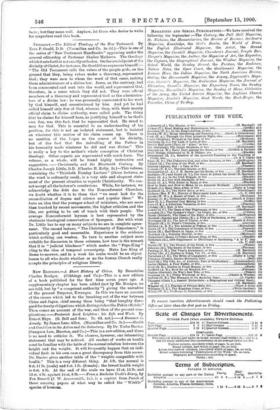Tarowerr.—The Biblical Theology of the New Testament. By Ezra P.
Gould, D.D. (Macmillan and Co. 3s. 6d.)—This is one of the series of " New Testament Handbooks " appearing under the general editorship of Professor Sheller Mathews. The theology which it sets forth is not e :reedy orthodox. On the crucial point of the divinity of Christ, for instance, Dr. Gould thus expresses himself:— "The Old Testament calls the rulers of the people gods, on the ground that they, being rulers under a theocracy, represented God; they were men to whom the word of God came, making them administrators of a divine law. Jesus, on the contrary, had been consecrated and sent into the world, and represented God, therefore, in a sense which they did not. They were official members of a theocracy and represented God as the administra- tors of a divine law : he was personally consecrated to his work by God himself, and commissioned by him. And yet he had called himself only Son of God, whereas they, with their merely official claim to divine authority, were called gods. The thing that he claims for himself here, as justifying himself to be God's own Son, was this fact, that he represented God. He stood to men for God. This is essential to an understanding of his position, for this is not an isolated statement, but is insisted on wherever this matter of his claim comes up. There is no mention of the Logos as the source of his divinity, but of the fact that the indwelling of the Father in his humanity made whatever he did and was divine." This is really a key to the author's whole conception of Christian theology. Other aspects are represented with much force. The volume, as a whole, will be found highly instructive and suggestive. — Christianity and the Nineteenth Century. By Charles Joseph Little, D.D. (Charles H. Kelly. 2s.)—This volume, containing the "Thirtieth Fernley Lecture" (three lectures, as the word is ordinarily used), is a very able and eloquent state- ment of the present situation as regards Christianity. We can- not accept all the lecturer's conclusions. While, for instance, we acknowledge the debt due to the Nonconformist Churches, we doubt whether it is to them that "we must look for the reconciliation of dogma and science and popular ideas." We have an idea that the younger school of ministers, who are more than touched by recent movements, the higher criticism and the like, are getting to be out of touch with their people. The average Nonconformist layman is best represented by the obstinate theological conservatism of Spurgeon. But with what Dr. Little has to say on many subjects we are in complete agree- ment. The second lecture, " The Christianity of Experience," is particularly good and seasonable. Experience is the evidence which nothing can weaken. To turn to another subject more suitable for discussion in these columns, how true is the remark
that it is "judicial blindness" which makes the "Pope-King" cling to the idea of temporal sovereignty. Make Leo King of Rome to-morrow, and in a week his realm would be an object- lesson to all who doubt whether or no the Roman Church really accepts the principles of religious liberty.






































 Previous page
Previous page